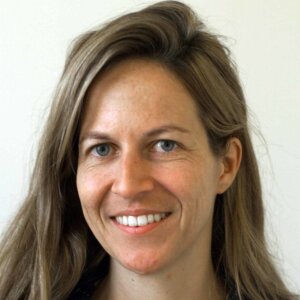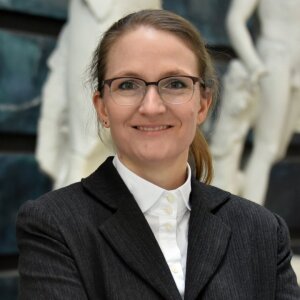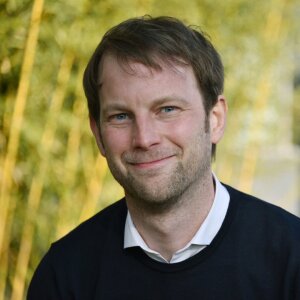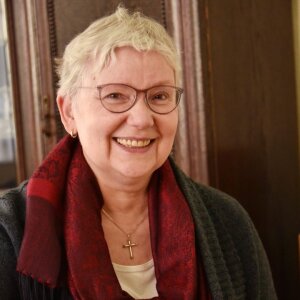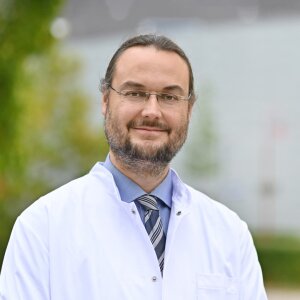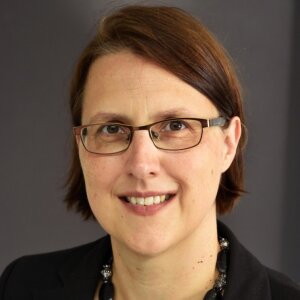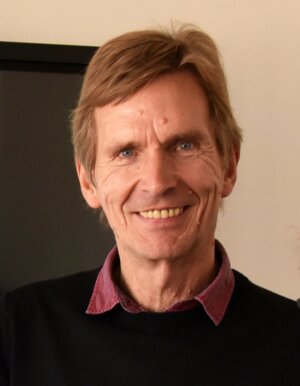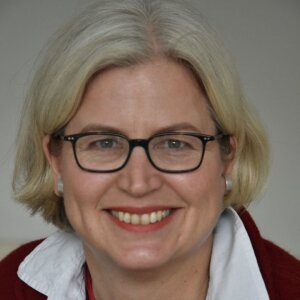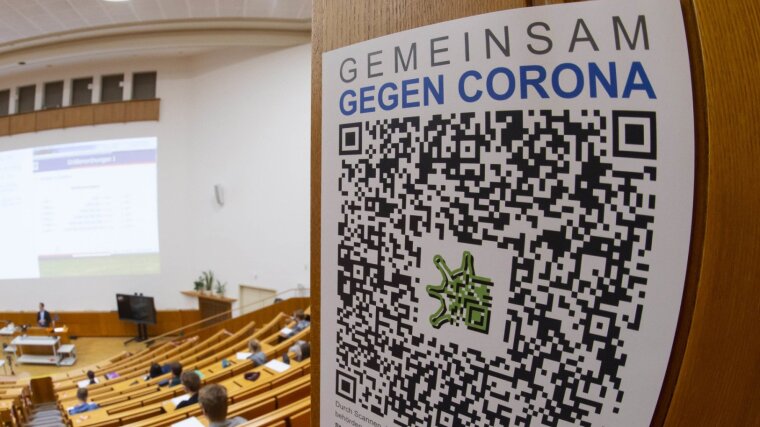
The year of crisis 2020 may have ended a few months ago, but the coronavirus pandemic rages on. Almost all walks of life are affected by the situation – from the economy to culture and society – and teaching and research are still running in ›COVID mode‹ at universities. What does this mean for scientists at the University of Jena? How do they look back on 2020 and what experiences have they taken away from it? We asked all ten faculties for their opinion.
Survey by Vivien Busse
Anna Leisner-Egensperger
(Professor of Public Law and Tax Law)
Prof. Dr. Anna Leisner-Egensperger.
Image: Peter Scheere/Uni JenaThe science of public law faced considerable challenges in 2020. While it was the hour of the executive in spring, the importance of our parliamentary democracy returned to the fore in summer. I’m currently involved in the federal government’s vaccination strategy as an external expert, which is proving to be an unexpectedly exciting task. With regard to my science and research, the past year has been productive and fulfilling in a way I am usually denied through my commutes on overcrowded trains and my work for equality committees – from commentaries on the German constitution and articles in various guides to the digital acceptance of many dissertation procedures.
A personal challenge has been looking after our four children, who are aged 11 to 15 and have had to be home-schooled during certain terms. As I’ve spent much time with them, I’ve had quite a few sleepless nights. I miss seeing lecture theatres full of people and having personal exchanges with students. That said, Zoom and Cisco are pretty good inventions.
Nikolaus Knoepffler
(Professor of Applied Sciences)
Prof. Dr. Nikolaus Knoepffler.
Image: Anne Günther (University of Jena)Since its beginnings at the Platonic Academy, the study of ethics has thrived on personal exchange. COVID-19 has therefore presented a huge challenge for the teaching staff and students involved in our master’s programme in ›Applied Ethics and Conflict Management‹ and our interdisciplinary course in ›Ethics (with History and Theory) of Medicine‹.
After all, the study of ethics isn’t just about putting forward our own moral opinions; it’s about communicating with others and learning to understand their arguments and views – and it’s even about having our own opinions questioned. The best possible argument ultimately has to be convincing and we have to find suitable, value-based solutions to morally relevant conflicts in particular historical situations. That’s why classroom-based teaching is so important in ethics – and that’s why I often find our digital classes so impoverishing, but I suppose this decision was inevitable when it came to balancing our interest in good health and classroom-based teaching in 2020.
Anke Lindmeier
(Professor of Mathematics Education)
Prof. Dr. Anke Lindmeier
Image: Anne Günther (University of Jena)Ever since the coronavirus reached our shores in March 2020, we’ve seen another example of how understanding mathematical concepts is so important for society. As a mathematics educator, I know that a maths lesson on exponential functions doesn’t necessarily guarantee that we can actually estimate growth correctly. It even took the most prominent branches of the media quite some time to develop suitable ways to represent the development of the pandemic. Some even dared to experiment briefly with logarithmic scales, but they were probably too mathematically demanding for many readers.
It’s difficult to predict the long-term effects of the coronavirus pandemic on research into maths education. Our studies with and at schools have practically come to a standstill. In view of the challenge posed by digital teaching methods, I fear that the research landscape will remain difficult for a long time, because computer-based surveys are still difficult to conduct at German schools (to name just one example). However, I hope that society recognizes the importance of research when it comes to learning mathematics.
Kai Papenfort
(Professor of General Microbiology)
Prof. Dr. Kai Papenfort
Image: Anne Günther (University of Jena)The year 2020 affected science like no other. As in many other fields, the pandemic has presented us with unprecedented challenges in science and teaching – and we’re still feeling the effects today.
At the same time, the public debate surrounding the COVID-19 pathogen has generated interest in scientific processes and highlighted the importance of infection research in a globalized world. One of the key lessons to be learned from the pandemic is that scientific findings should play a central role in political decision-making processes. It remains to be seen whether this principle will be implemented in the »post-COVID world«.
Corinna Dahlgrün
(Professor of Practical Theology)
Prof. Dr. Corinna Dahlgrün
Image: Anne Günther (University of Jena)Since March 2020, the scientific world has largely been banished to the confines of book-heavy offices displayed in little boxes in the corner of our Zoom calls. My field of research concerns the Church, which is trying to respond to many acute needs as well as possible and developing a creative touch in the process. As a practical theologian, it’s my job to reflect on the current developments and suggest courses of action. One such attempt is a homiletics seminar entitled ›Preaching for the Internet‹. In the first half, we looked at worship formats from various German and English churches to find criteria for good practice. This was followed by films made by our students, who had their difficulties but learnt a lot.
Such positive experiences of online teaching are leading to further ideas. Next winter, for example, we’ll be holding a seminar on Jesus films in cooperation with the Bonn New Testament scholar Hermut Löhr – interdisciplinary, nationwide and digital.
Martin Walter
(Professor of Psychiatry and Psychotherapy)
Prof. Dr. Martin Walter
Image: Michael Szabo/UKJSix months after starting my position as director of the University Hospital for Psychiatry and Psychotherapy, the coronavirus pandemic has revealed the strengths and weaknesses of my new institution like a magnifying glass and my search for practical solutions has put me in touch with some amazing people. Instead of setting up a new scientific department, we had to deal with the crisis and take responsibility for the special demands placed on our employees and patients. It’s been impressive to see my colleagues excel themselves and grow together as teams. New technical solutions have suddenly emerged, such as those developed in the field of digital psychotherapy.
Our MRI research on people has been postponed for the time being. As we’re lacking results from our own experiments, we’re cooperating with international teams to evaluate existing data sets and benefiting from our teamwork in the age of social distancing. New problems such as ›post-COVID fatigue‹ have given rise to novel initiatives and large-scale cooperative projects on inflammation and mental health in Jena.
Silke Übelmesser
(Professor of Economics and Public Finance)
Prof. Dr. Silke Übelmesser
Image: Anne Günther (University of Jena)The coronavirus pandemic presents a wide range of challenges in everyone’s private and professional lives. Many economic issues are closely related to the pandemic, such as the effects on the economy and especially on public finances.
However, the coronavirus pandemic is too complex to be adequately evaluated from the perspective of one discipline alone; an interdisciplinary approach is helpful. As a member of the Scientific Council for Pandemic Management of the Thuringian State Government, I have the opportunity to discuss the complexity of the situation with other scientists in an interdisciplinary setting to develop recommendations for political decisions. Let’s hope we can work together to gradually overcome the pandemic in 2021 and take a step back towards normality.
Andreas Tünnermann
(Professor of Applied Physics)
Prof. Dr. Andreas Tünnermann
Image: Anne Günther (University of Jena)2020 was also an opportunity to develop new approaches to research and teaching. For example, the University of Jena worked with the Max Planck School of Photonics and the Fraunhofer IOF to inaugurate a ›Digital Teaching Lab‹, where students can conduct experiments via augmented reality (e.g. a Fourier optics test). This means we’re creating new settings for research-oriented teaching, even beyond the coronavirus situation.
2020 was the year in which we came together digitally: As part of our ›lecture series‹, for example, Nobel laureate Stefan Hell held a virtual talk for our doctoral candidates. People from all over the world also discussed their research during our open ›coffee breaks‹. This is a huge opportunity for science! Nevertheless, virtual meetings are no long-term replacement for personal contact and I look forward to seeing people in classrooms again soon.
Jürgen Bolten
(Professor of Intercultural Business Communication)
Prof. Dr. Jürgen Bolten
Image: Anne Günther (University of Jena)One of the key focuses of intercultural research is the constructive handling of unfamiliar, unsafe and disruptive situations. With this in mind, analysing public communication practices in the coronavirus pandemic can provide extremely useful insights when it comes to understanding the roots of social and ›cultural‹ polarizations and developing proposals for action aimed at creating a more ›cosmopolitan‹ and ›cohesive‹ society.
The extraordinary circumstances of the pandemic have given us new impetus in teaching. The idea of global virtual collaboration is especially challenging in an intercultural context. The forced development of digital action plans with video conferencing systems has resulted in significant technological leaps, such as the development of intercultural simulations in the IVAC project or the cross-border, cooperative initiative for virtual teaching on glocal-campus.org. It’s particularly encouraging to see a steady rise in the acceptance of virtual collaboration.
Mirka Dickel
(Professor of Didactics of Geography)
Prof. Dr. Mirka Dickel
Image: Anne Günther (University of Jena)Facing the state-imposed lockdowns, social distancing, uncertainties and unpredictabilities associated with the socio-political global corona crisis, questions about human self-assurance in modernity became pressing. For sure, we live in times of ›transcendental homelessness‹ (Georg Lukács).
My questions literally got to me, left me no peace, drove me to research. Specifically, I was concerned with the question of what it means to speak of scientific responsibility. What does it mean for me and for us scientists to bear responsibility for life and survival on our planet? What human-nature relationship is worth to convey in scientific and societal discourse? Which human-nature relationship can we truly advocate? In other words, what good reasons are there for our research and how can they be argued? Good reasons, philosophically speaking, are reasons that stand up to argumentative scrutiny and thus point to reflection. In 2020, I questioned the presuppositions of research in modernity and addressed the relationship between epistemology (knowledge theory) and ontology (logos) with respect to scientific responsibility.
